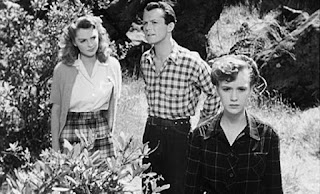Directed by Delmar Daves; produced by Sol Lesser
Pete Morgan (Edward G Robinson) runs his farm with the help of
his sister, Ellen (Judith Anderson) and their adopted daughter, Meg (Allene
Roberts). But he is aging, and Meg persuades him to hire Nath Storm (Lon
McCallister), a young local man. Warned by Pete to stay out of the nearby
woods, and away from its mysterious Red House, Nath’s curiosity is aroused, as
is Meg’s; the girl feels connected to the abandoned building somehow. Yet the
more questions the young pair ask and try to answer, the stronger becomes
Pete’s desire to keep the answers hidden.
The Red House is an eerie and unusual film, possibly a film noir, but more of a psychological thriller. As is usual with successful movies, it depends not just on one element, but on acting, directing and writing.
In
terms of acting, Robinson is a big part of the movie, though he doesn’t carry
it; he isn’t even really its centre. This actor, who could play villainous and
sympathetic, comedic and dramatic, nonetheless provides much of the action, if
dialogue and emotion that move a story may be termed that. He manages well to
convey a man haunted by a past that may or may not undo his appearance of
decency.
Lon
McCallister is probably an unfamiliar name to many now, despite his second billing here. He forsook acting in
his forties, and The Red House is
likely his most significant rôle. He does very well in it, though his character
doesn’t really give him much to work with. Allene Roberts started acting with The Red House; the reason for the
brevity of her career – even shorter than McCallister’s – is clear; she is
adequate as a performer, but no more.
The
screenplay is good; co-written by the director, it effectively creates a sense
of tension, especially when concerned with Robinson’s character. There is,
perhaps, too little to the secret at the heart of the movie’s mystery; the
viewer may guess at least the gist of it some time before it is revealed. That
doesn’t mar the story. Indeed, the finale is both exciting and fitting.
Delmar
Daves is another name that might be largely unknown these days, though with
much less reason than McCallister’s. As a writer, he penned Love Affair, Destination Tokyo, Dark Passage, and A Summer Place, among others. As a
director, he helmed some of those films, and more. One of the factors to making
The Red House work is the contrast
that Delves makes between the pleasant countryside, with its open fields,
well-kept farms and swimming ponds, and the claustrophobic woods, the overgrown
cabin and menacing shadows. As well, the direction – and the script – shows the
loving, almost chummy relationship between Nath and his mother – he keeps
trying to get her to marry her long-time admirer – next to the unhealthy
obsession centred about the title house. The aspects of light and dark are more
than just visual.
Neither
a ghost story nor a tale of crime, The
Red House manages to combine these features – at least figuratively – in a
movie that will, even if it doesn’t keep you guessing until the end, will keep
you entertained.





























